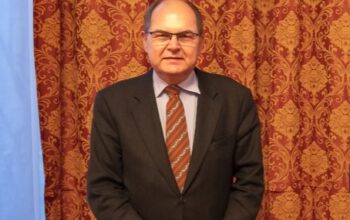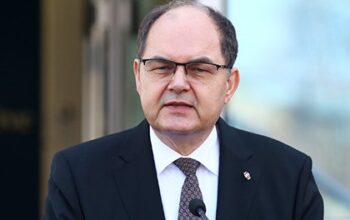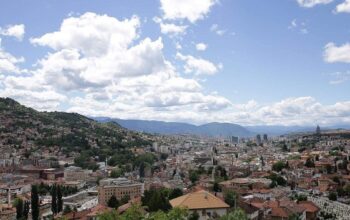This week the United Nations Security Council will discuss the situation in BiH as it does two times each year. By now, over 20 years since the armed conflict ended in a settlement formalized by the Dayton Peace Accords, these discussions have become entirely formulaic.
The US and UK, and other members delivering US/UK-drafted talking points, will view with critical alarm “divisive statements” from Republika Srpska leaders. Serious divisive statements and actions by leaders of the Bosniak parties will not be mentioned.
The Austrian diplomat currently holding the title “High Representative” must also play his role. He will deliver a report drafted by his staff, many of whom have made comfortable careers in Sarajevo, which is also largely formulaic. Because the major Bosniak political party, SDA, relies on the High Representative and US/UK intervention in domestic political affairs to support SDA policies, the High Representative’s report must view the situation in BiH with alarm and opine that, notwithstanding the absence of ethnic or other violent conflict since 1996, BiH still somehow represents a threat to international peace and security. The Council, therefore, must continue to act under Chapter VII of the Charter which, it is argued, allows foreign intervention in domestic political affairs. The High Representative’s assessment also ensures the continuation of his own and his staff’s employment.
Unfortunately, rather than facilitating political and economic progress, certain states have intervened in the domestic affairs of BiH in support of SDA positions, which has disrupted democratic and constitutional governance in BiH and blocked consensus-building among ethnic groups and political parties.
To provide a realistic appraisal of the situation in BiH, the Editor’s Journal will provide here and in succeeding weeks a series of brief summaries of progress and problems from the RS perspective. This perspective is generally left out of the Security Council’s deliberations. Our intent is to foster critical analysis and solutions to issues that impede improvement of the situation in BiH.
Republika Srpska has enacted far-reaching reforms in recent years to harmonize its laws with EU standards, improve its business environment, and otherwise promote economic development.
In December 2015, fulfilling a key element of the EU-sponsored Reform Agenda, Republika Srpska enacted a new Labor Law in the face of fierce opposition, including from the main RS opposition party, SDS. The new law facilitates job creation while protecting employee rights and brings the RS’s labor and employment regulations into line with EU standards. By passing the law, the RS met a key requirement set by the IMF for release of IMF funding, which in turn is needed for release of World Bank funding – both of which will benefit the RS and Federation.
The EU’s 2015 Progress Report for BiH notes that the RS, as recommended by the EU, adopted in September 2015 “a law on fiscal responsibility, including establishment of an independent Fiscal Council and a fiscal rule limiting government expenditures and deficits.”¹
Republika Srpska also continues to intensify its fight against corruption and organized crime. The RS has been praised by the Moneyval Committee in the area of criminal proceeds recovery and the fight against money-laundering, in particular for the Ćopić case, which will be included in Moneyval’s money-laundering typology as an outstanding example of prosecuting money-laundering and criminal proceeds recovery. In addition, the RS has a well-established asset recovery system and a functional asset recovery agency, which is fully capacitated to enforce the Law on Criminal Proceeds Recovery.
The EU’s 2015 Progress Report for BiH notes, “In 2013 and 2014, Republika Srpska carried out an ambitious set of reforms to reduce business registration time and costs. The Republika Srpska authorities also started a single registry for companies.”² Similarly, the IMF’s most recent report on BiH said, “Important steps have been made in the last two years under the Fund-supported program to improve the business environment. In line with the [World Bank] recommendations a one-stop shop for business registration was established in the RS to make it easier to start and operate a business.”³
In the first two years of the one-stop shop’s operations, the number of registered businesses increased by 30%. Also, in order to further implement comprehensive reforms in this area, as recommended by the RS Government, the RSNA, at its 10th regular session held on 17 March 2016, adopted a draft strategy to facilitate foreign investments in the RS for the period 2016 – 2020 and a corresponding action plan.
The European Stability Initiative recently recommended that in order to ease business registration, “[a]ll the Federation needs to do is to copy the reforms adopted in Republika Srpska.”4 As part of reform-oriented incentives to investors, in February the RSNA enacted a new bankruptcy law, the purpose of which is to enable timely bankruptcy proceedings, reduce bankruptcy proceedings, ensure a higher level of control over the performance of trustees, ensure a higher level of protection of creditors, and shorten the time required for the proceedings.
The RS has actively participated in the regional project for certification of municipalities with favorable business environments (BFC SEE) along with Croatia, Serbia, Macedonia and Montenegro. The cities of Banja Luka and Bijeljina and municipalities of Teslić and Mrkonjić Grad were awarded the regional certificate. By the end of April, the city of Prijedor will have extended its existing certificate. A number of other local governments of the RS are now at different stages of the certification process.
Republika Srpska’s increasingly business-friendly environment is drawing notice. This year, the Financial Times’ Foreign Direct Investment (FDI) Magazine ranked Republika Srpska’s third-largest city, Prijedor, among the top ten “Micro European Cities of the Future.” Studies that have examined the RS’s business environment have praised RS reforms. Even before the RS’s most recent reforms, the World Bank’s 2011 report Doing Business in South East Europe cited the RS’s largest city, Banja Luka, as one of the two cities in the region that had improved their business environments the most.
The RS’s reforms are helping the RS economy to recover from 2014’s floods and the European economic crisis. The RS economy is expanding, unemployment is declining, and salaries are rising. The RS registered year-over-year GDP growth of 2.8 percent in the Fourth Quarter of 2015, the most recent quarter for which data is available.
_________________
1 European Commission 2015 Progress Report on Bosnia and Herzegovina, 10 Nov. 2015, at p. 33.
2 Ibid.
3 International Monetary Fund, Staff Report For The 2015 Article IV Consultation, 9 Oct. 2015, at p. 9.
4 Bosnia as Wunderkind of Doing Business, Outline of 14 steps to take, European Stability Initiative, 19 March 2015, at p. 13.
Fuller coverage of this and other current elements of the situation in BiH is included in Republika Srpska’s 15thReport to the UN Security Council, available on this site.


